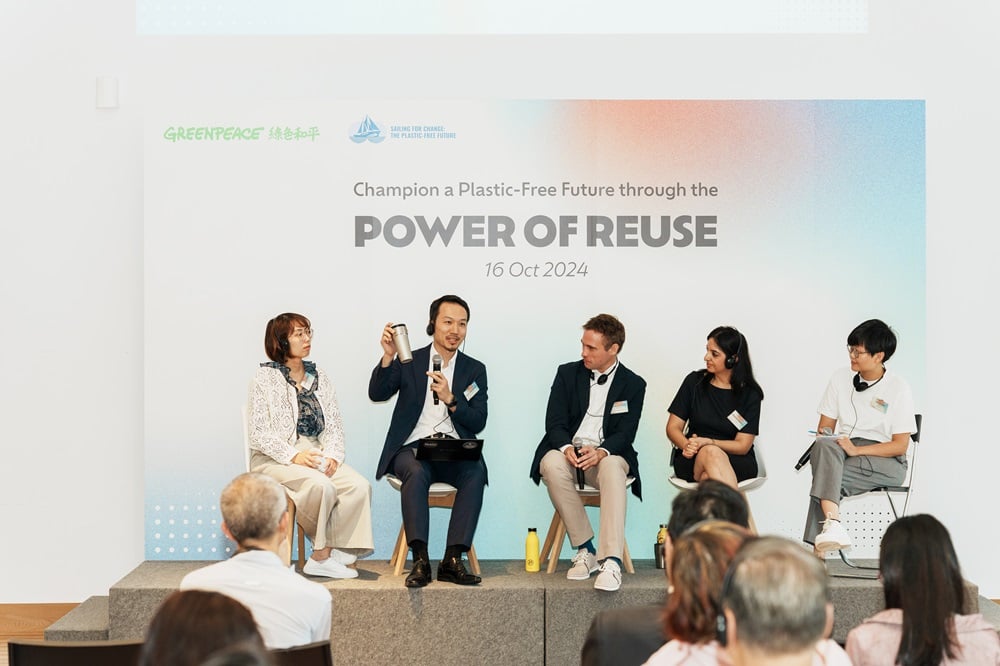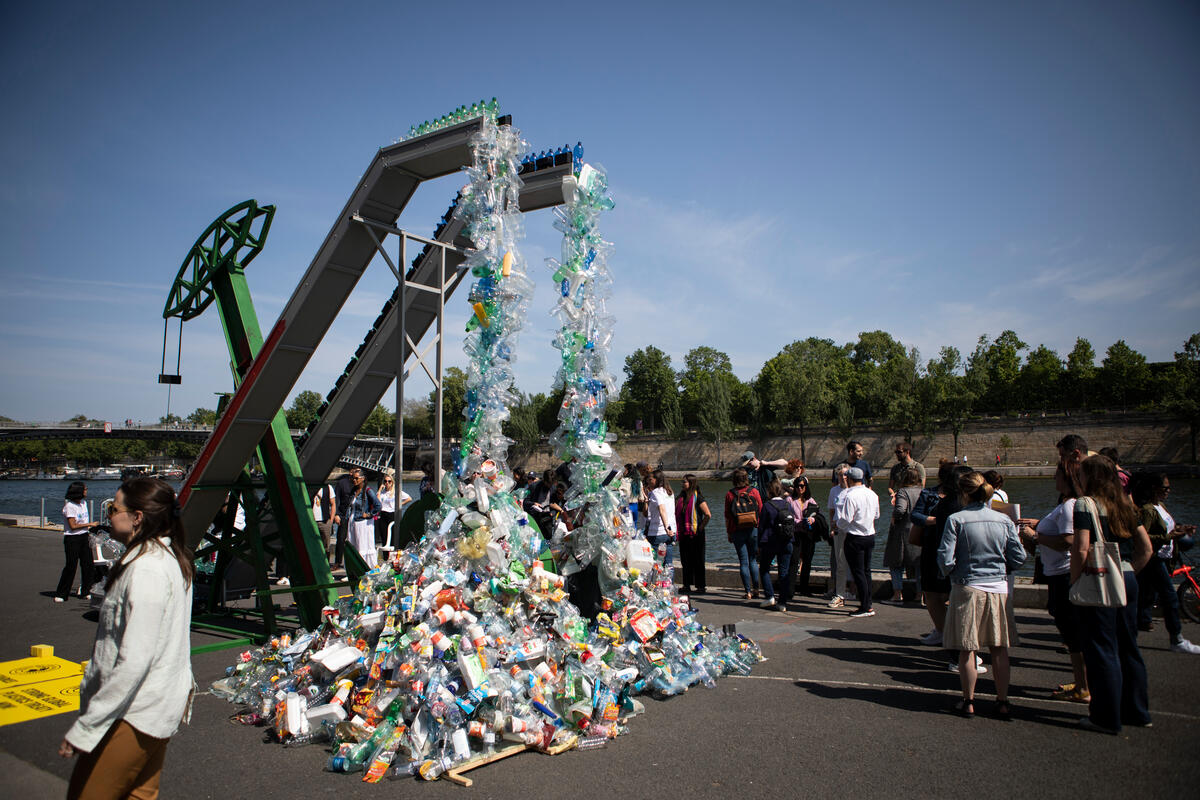In Hong Kong, the Environment and Ecology Bureau submitted a paper on the amended Product Eco-responsibility Ordinance to the Legislative Council, planning to accelerate the legislation on plastic ban, making the first phase of the scheme to be implemented by the 4th quarter of 2023, and for the first time, setting a time frame for the second phase to be by 2025.
Earlier on, Greenpeace join-hands with other green organisations and mobilised 5,300 members of the public to ask for a tighter control of single-use plastics. Thanks to your support, we have successfully urged the government to respond to our call for a complete plastic-ban by 2025.
However, what kind of disposable plastic wares will be banned first? Can the current policy really improve our environment and reduce the impact caused by plastic pollution? Is a reusable system the best alternative option to help achieve waste reduction at the source? Let’s dive into this.
1. Which plastic wares will be banned first? Which of them will be regulated in 2025 in the plan?
First Phase (earliest by the 4th quarter of 2023):
- Ban in disposable plastic tableware provided by restaurants
- EPS tableware (dine-in + takeaway)
- Straws (dine-in + takeaway)
- Stirrers (dine-in + takeaway)
- Cutlery (dine-in + takeaway)
- Plates (dine-in + takeaway)
- Cups (dine-in only)
- Food containers and their covers (dine-in only)
- Ban in the sale and free distribution of other disposable plastic products
- Cotton buds
- Glow sticks
- Umbrella bags
- Party hats, cake toppers, inflatable cheer sticks, balloon sticks
- Food sticks, plastic toothpicks, Toothbrushes with plastic handles, plastic combs, and bottled water giveaway for free in hotels
- Oxo-degradable plastic products
- Hotel toiletries (including plastic-handled toothbrushes, plastic combs, etc.) and plastic-bottled water provided in the hotel rooms
- Plastic packaged tissue paper for promotional use
Second Phase (setting a time frame by 2025 for the first time):
- Ban in disposable plastic tableware provided by restaurants
- Cups and cup lids (dine-in + takeaway)
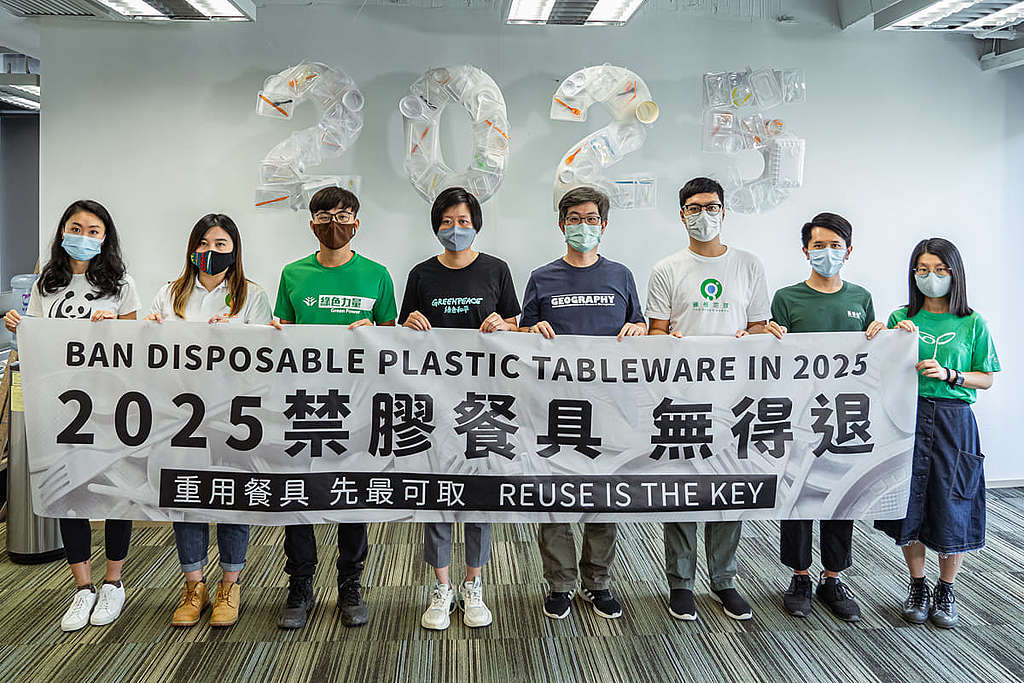
2. What are the penalties? Are there any exemptions?
As suggested, anyone who violated the regulation is liable to a fine of a maximum HK$100,000; there is also a fixed penalty system and law enforcement officers can issue a fixed penalty notice of HK$2,000.
The below 3 situations are exempted:
- Pre-packaged food and beverages, for example, straws attached to beverage cartons, cutlery provided inside cup noodles and ice-cream cups
- Customers to use disposable plastic straws due to medical needs
- Disposable plastic tablewares needed in premises due to medical or security needs, such as hospital wards, correctional facilities, etc
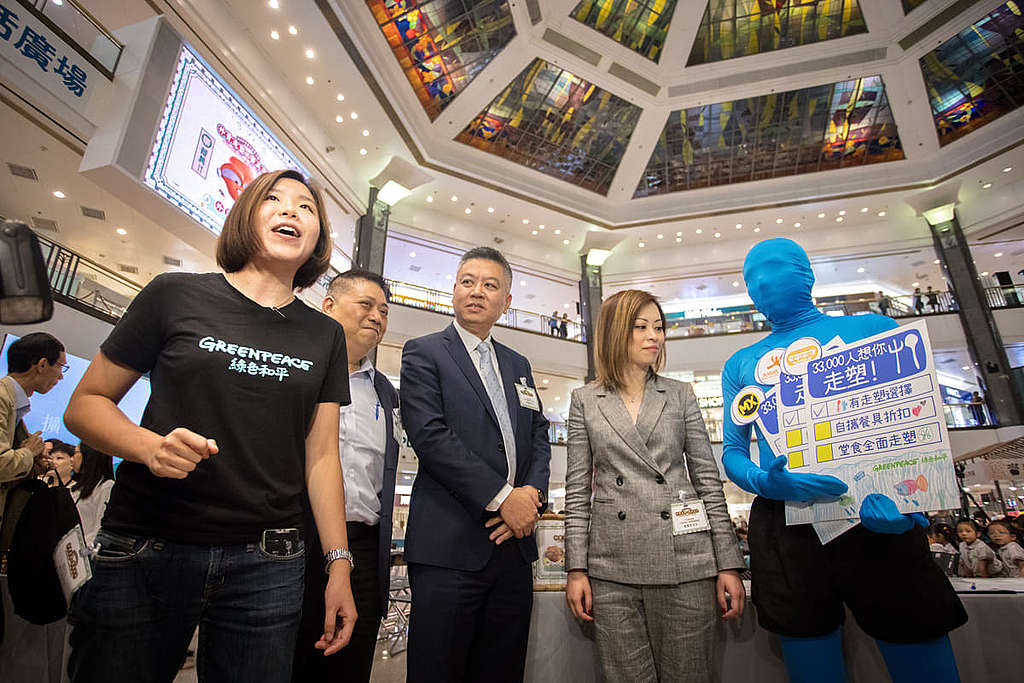
3. Questions remained: 3 things we can’t forget
Greenpeace is glad to see the progress which is to reduce the amount of disposable plastic tablewares dumped at landfill sites (currently about 266 tonnes per day). However, we also urge the government to also provide feasible alternative options, to help achieve waste reduction at the source:
Choice of materials can be shifted, the focus should be on “disposable”
No resources are allocated to provide alternative solutions, such as a reusable rental system. It is possible that the excessive use of disposable plastic wares might be shifted to other disposable materials, such as paper or bamboo – which will only be false solutions.
Prepackaged food and beverages are not regulated
In the public consultation, most of the people disagreed to exempt pre-packaged food and beverages from the regulations, but they are still exempted – which is clearly a policy loophole.
A schedule to promote reusable containers is a must
Apart from advocating a plastic ban, it is important to allocate resources to promote a reusable utensil rental model and to set up a reward system to motivate those who brought their own containers.
In Taiwan, chain stores are required to provide discounts to customers who brought their own cups; in France, businesses are required to provide a concrete schedule for implementing the drink refill option. Greenpeace urges the Hong Kong government to put extra effort into promoting reusable utensils rental systems in order to achieve waste reduction at the source.
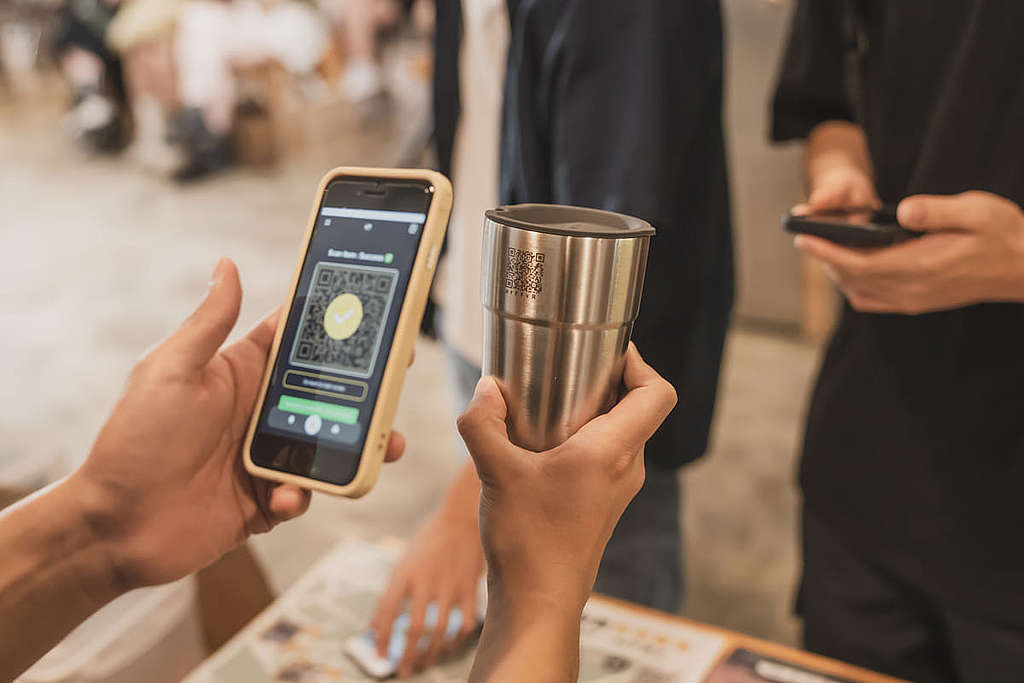
4. Reuse revolution: the real answer to the plastic crisis
In the document submitted to the Legislative Council, there is a list of plastic reduction cases that happened around the world in recent years, however, the focus in the document was mainly on the legislation. But most of the countries or regions also set a concrete plastic reduction target and a roadmap for promoting reusable containers.
For example, in Taiwan, chain stores are required to provide cup rental service; in France, businesses are required to set a yearly target for the implementation of the drink refill option.
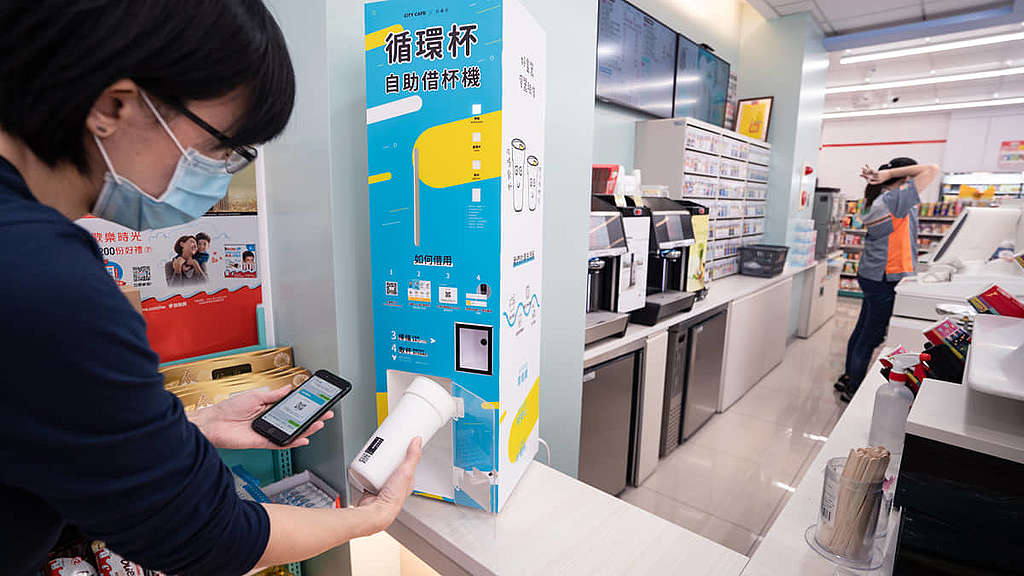
On top of urging the authorities to work on alternative options, Greenpeace pioneered in collaboration with a local start-up company and 6 cafes, and launched the “Sheung Wan Borrow and Return Cup Program”. The program is a way to explore the feasibility of a reusable cup rental system.
5. What did Greenpeace do in promoting plastic free?
Dating back to 2017, Greenpeace has been tackling the local plastic pollution caused by disposable plastic tablewares. With the use of scientific research data, we unveiled the reality of how fast-food chains distributed disposable plastic tablewares. We established a network in Hong Kong to create a friendly environment for going “plastic-free”. We put into practice creative solutions such as a reusable utensil rental system.
Thanks to your support, we’ve achieved so much together in pushing social changes in Hong Kong:
- 2017: Conducted site investigations at Mcdonalds in Hong Kong with volunteers, and estimated that the amount of disposable plastic tablewares given out during lunch hours is equivalent to the height of 72 IFC (International Financial Centre) buildings. Following the release of our study, Mcdonalds announced to phase out styrofoam, McFlurry plastic cups, and to implement “ Go Strawless Everyday”.
- 2018: Unveiled the reality of how 8 fast-food chains distributed disposable plastic tablewares; brought forward citizens’ demand for going plastic-free during their shareholders’ meeting. Our action successfully led to concrete plastic reduction measures from fast-food chains, e.g. not giving out plastic straws proactively and cutting use of plastic stirrers.
- 2018-21: Cultivated a plastic-free community; recruited volunteers to persuade shop owners going plastic-free or offering discounts for plastic-free purchases; successfully connected and mapped over 1,100 plastic-free shops.
- 2021: Conducted a “reusable utensils rental” social experiment at Lo Tak Court, Tsuen Wan twice, providing a trial opportunity for customers to enjoy street food in a plastic-free environment. More than 1,470 disposable utensils were saved and the return rate was close to 100%.
- 2021: Partnered with other 9 green organisations to urge the government to regulate disposable plastic tablewares by 2025, and have mobilized 5,300 locals to ask for a tighter control of single-use plastics.
- 2022: Launched a smart reusable cup rental system with collaboration with a local start-up to provide feasible and realistic solution to the local plastic crisis
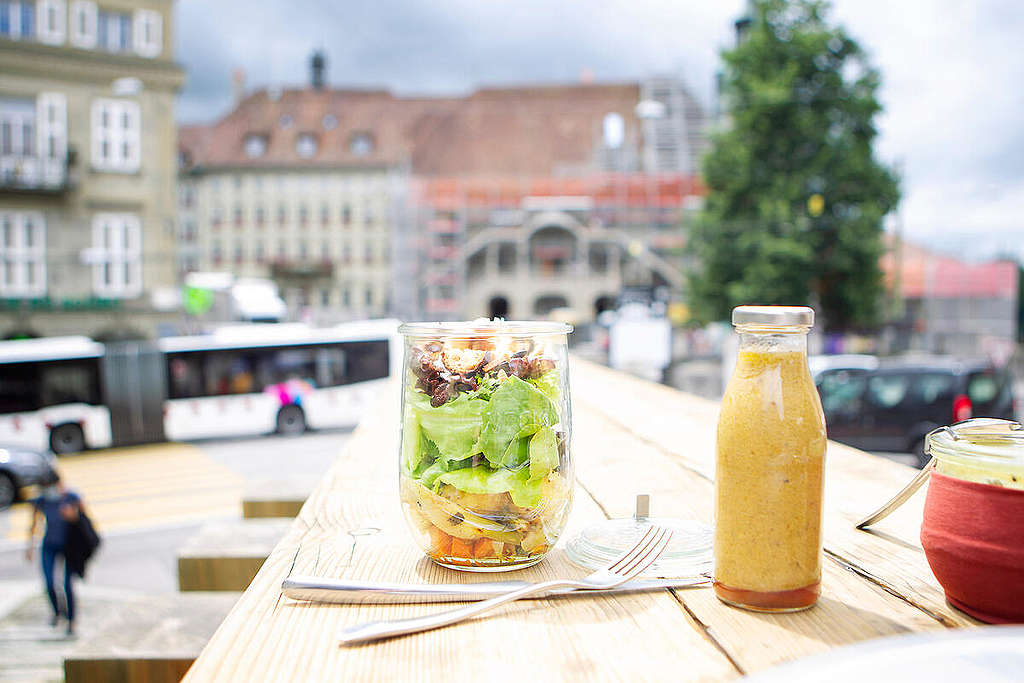
A big THANK YOU to our supporters for joining us in the journey. We share in the belief that action is vital if we are to drive real change and save our planet. If you’re able to, we hope you will consider supporting us today by making a single or recurring contribution. Every donor contribution, however small, is so valuable for our plastic-free, green future.

-1.jpg)
